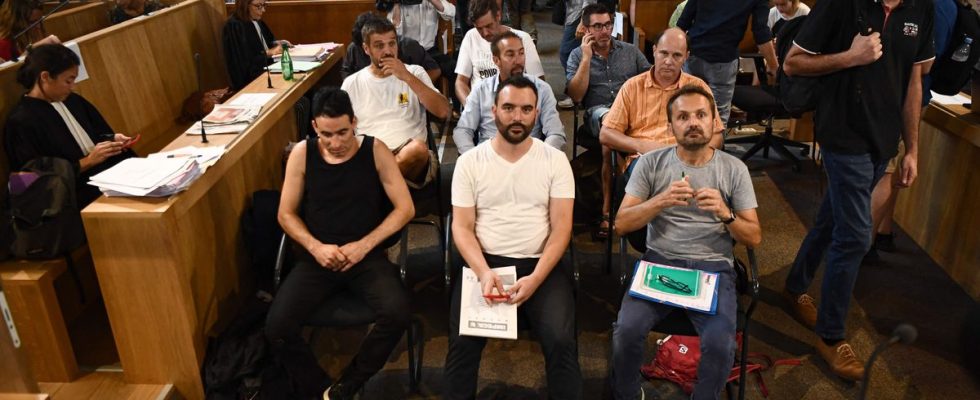They were not alone this Friday, many supporters remained at the court door. The right to demonstrate is at the heart of the trial of union leaders and environmental activists on trial in Niort for having organized rallies against “basins” in Sainte-Soline (Deux-Sèvres) banned by the authorities.
A “political” trial
Five of the nine defendants (Benoît Feuillu and Basile Dutertre, activists of the Earth Uprisings, Benoît Jaunet and Nicolas Girod, representatives of the Peasant Confederationas well as Julien Le Guet, spokesperson for the collective “Basines no thanks”) are being prosecuted for the demonstration of March 25 which gave rise to violent clashes with the police.
Three of them were also there for the previous demonstration on October 29, as were two trade unionists from the CGT and Solidaires, David Bodin and Hervé Auguin. They face six months’ imprisonment and a fine of 7,500 euros.
Two other defendants appear for violence, theft and damage in connection with the demonstrations. Justice finally criticizes some for having refused a genetic fingerprint. All denounce a “political” trial intended, according to them, to muzzle opposition to “basins”, a nickname given to contested agricultural water reserves in Deux-Sèvres.
“It shows how far the government wants to go,” declared Hervé Auguin, delegate of the Solidaires departmental union in Deux-Sèvres, before the hearing. “We are being called eco-terrorists, it is unacceptable. The judge’s decision will be historic. There are nine of us, next time there will be hundreds,” he added.
“These trials only strengthen our determination,” Basile Dutertre told the press, in a square in Niort where a large support rally is being organized.
At the end of the morning, 2,000 people were present, according to the Deux-Sèvres prefecture, which prohibited demonstrators from approaching the court.
“A criminalization of political and union action”
In terms of form, the defendants’ lawyers question the reasons for prosecuting individuals rather than the organizations they represent. Me Alice Becker, counsel for the CGT, sees in this “a desire to intimidate individuals and cause fear”.
On the merits, the defense denounces an attack on the right to demonstrate aimed at “discouraging social movements”, according to Me Pierre Huriet who will argue for Solidaires.
Chirine Heydari-Malayeri, Inès Giacometti and Balthazar Lévy, lawyers for the Confédération paysanne, deplore “a criminalization of political and union action” while this organization defends “equal access” to water, an “essential common good”.
Sixteen “basins” are planned, including that of Sainte-Soline, the largest. The reservoirs dug into the earth aim to store water drawn from groundwater in winter, in order to irrigate crops in summer when precipitation becomes scarce.
Their supporters make it a crop insurance essential to the survival of irrigating farmers (a minority within the profession) in the face of repeated droughts. Opponents denounce a “grabbing” of water by “agro-industry” and call for a moratorium.
It’s Gérald Darmanin, “who should be in court today”
“Thought by our parents, megabasins will make our children thirsty”, “Let’s change our agricultural model, let’s keep water in the soil”, could we read on banners held up Friday morning in Niort.
After initial violence in October in Sainte-Soline, the March demonstration quickly degenerated into clashes with the gendarmes, leaving many injured. Two demonstrators spent several weeks in a coma. In a report, the Human Rights League denounced a “disproportionate use” of weapons (grenades, LBD) by the police.
The general secretary of the CGT, Sophie Binet, judged Friday in Niort that the “scenario” of the trial was “written in advance” by the government “to place responsibility on our peaceful, known, long-standing organizations. of the serious violence which took place in Sainte-Soline”.
According to her, it is the Minister of the Interior, Gérald Darmanin, “who should be in court today”, “since it was he who, the day before the demonstration, announced that it would be extremely violent” . The national secretary of EELV, Marine Tondelier, and the leader of LFI deputies, Mathilde Panot, are also expected.
The debate on the right to demonstrate began Thursday before the administrative court of Poitiers, where several unions attacked in vain the prefectural decrees prohibiting any “gathering” around the court and authorizing the police to use surveillance drones.

